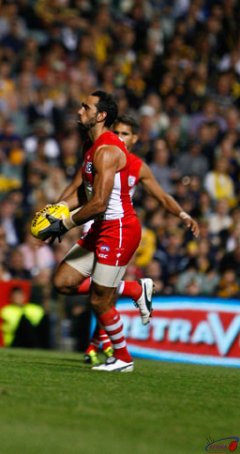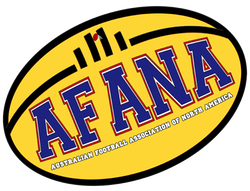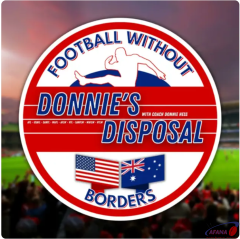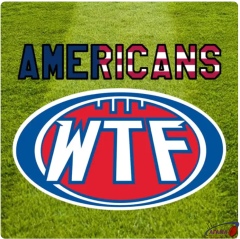
An editorial from Brook Kilpatrick, AFANA's staff member in Adelaide, with contributions by Chris Kowald, in Perth.
American sports fans have reacted to “The Australian Dream” after ESPN recently aired the Australian AFL documentary that focuses on the racism encountered by Sydney Swans legend Adam Goodes.
US website “Brinkwire” has reported an “outpouring of support” for Goodes after viewers learned of the “incessant taunting and booing” that was directed at Goodes throughout the tail end of his career. (https://en.brinkwire.com/news/americans-claim-racism-is-worse-in-australia-after-espn-screens-the-adam-goodes-documentary/ )
The cutting quote that some Americans claim racism is “worse in Australia” is certainly cause for discussion, and it cannot be denied that indigenous Australian AFL players such as Adam Goodes have experienced the worst of it at various stages throughout their career. Australian football greats such as Maurice Rioli, Phil and Jim Krakouer, Nicky Winmar, and current player Eddie Betts have all spoken about the racism they have encountered throughout their football lives, with some such as Betts, actively being involved in campaigns to educate with a view to eradicating such abhorrent behavior. Betts recently called out a person who posted an image of a chimpanzee on his Twitter page. Winmar recently forced an apology from three Melbourne journalists who claimed Winmar's iconic gesture was not related to racial issues.
The documentary centers on an incident that occurred during a match between Collingwood and Sydney in 2013, when Goodes physically gestured to security to point out a 13 year-old Collingwood supporter who had racially abused him during the game. The fallout from the nationally televised incident was significant, and when Goodes was awarded “Australian of the Year” in 2014, he used the platform to raise awareness of the plight of Indigenous Australians. In doing so, he used the term “Invasion Day” in regard to the first white settlers arriving on Australian soil, and despite his message being one of reconciliation and moving together as one, some sections of the media chose those two words and turned them into a campaign against Goodes.
For most of the 17 games Adam Goodes played in 2015, he was relentlessly booed by groups of opposition supporters. It was excruciating as a football fan to watch. Many claimed they were booing him because he played for free kicks, but it was much more than that. An incident during Round 9, 2015, coincidentally a round named the “Sir Douglas Nicholls Round”, celebrating Indigenous Australians, occurred when Goodes ran towards the Carlton cheer squad in celebration of a goal and performed part of an Aboriginal war dance which included a “spear throwing” motion. This incited those already against Goodes even more, and baiting Goodes with boos became part of the "entertainment" for opposition supporters. Goodes eventually retired after taking a mental health break in the 2015 season, as he could no longer enjoy the game he loved.
Americans watching the documentary would have seen what Goodes went through, his stance against racism, and the abysmal treatment he received from a section of the Australian football public and media. It is no wonder they were shocked, outraged, and no doubt educated as to the level of racism that still exists today across Australia. The Brinkwire article also quotes ex-NFL player and U.S. sports radio commentator Pat McAfee, a self-confessed AFL fan, who regularly uses Twitter to engage with AFL fans. He tweeted “I love learning more and more about the greatest sport I’ve never heard of and also about the continent that created it. A LOT to catch up on here...’”
The reaction from US audiences was condemning for Australians, as it should be. Racism in any form while currently at the forefront due to the current "Black Lives Matter” movement is not to be tolerated, and no doubt in Australia the AFL, in particular, is working hard on educating fans with a view to stamping it out. Interestingly current NFL rosters are made up of 70 percent African-American players, while the AFL has just over 10 percent indigenous players on their lists. The journalists who expressed the most blatantly racists statements in the documentary were Victorians. This is no accident. People living in Melbourne have limited opportunities to socialize with Aboriginal people and have limited personal exposure to Aboriginal issues. The original Aboriginal population of Victoria was decimated, soon after the English arrived, due to a combination of localized acts of warfare and exposure to European diseases. There are very few Victorian-born Aboriginal footballers in the AFL. The bulk of Aboriginal players originate from Western Australia and the Northern Territory. This lack of direct interaction, inside and outside of the sport, leads to ignorance. From ignorance comes the prejudice and casual racism expressed in the documentary.
The AFL continues to work hard creating programs and initiatives with indigenous programs nationwide which aim to increase participation, identify pathways for players, and more importantly to assist community clubs to be culturally aware and to embrace indigenous protocols. The Sir Doug Nicholls Round continues each year and has been running since 2006 as a celebration of Aboriginal and Torres Strait Islander peoples, their culture and history. The Richmond Football Club, for example, has their own “Korin Gamadji Institute”, which is a unique educational and training facility that supports and incubates leadership and employment pathways for Aboriginal and Torres Strait Islander people. The Fremantle Football Club, which has more Aboriginal players than any other AFL club, recently canceled the membership of a member who threatened to ask for a refund if their players "took the knee" to recognize Black Rights Matter in a game against Brisbane.
Adam Goodes went through a lot on and off the field, as did many of our indigenous AFL players. American fans of our game are right to be shocked and dismayed at the treatment dished out to one of the greats of our game, with any conversation on the topic being important. As for the comment that “racism is worse in Australia” than in America, this is not where our focus should be. The conversation should not be about “which countries fans are worse”, it should be about how we can all work together to eliminate racism fully, and not just on the sporting arena. As the great Martin Luther King Jr. stated “We must learn to live together as brothers or perish together as fools.”
If you want to know more about the diversity of our indigenous AFL players, please click on the article below. It contains an excellent map that shows the vast and varied areas that our indigenous players come from.
http://www.aflplayers.com.au/article/afl-players-launch-2020-indigenous-map/
This editorial represents the views of AFANA and its staff and should not be construed to necessarily represent the views of our sponsors, business partners, advertisers, or network partners.
Article last changed on Sunday, July 05, 2020 - 4:09 PM EDT






